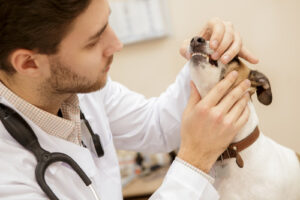Dental disease in dogs is a common yet often overlooked aspect of pet health. As a responsible pet owner, understanding the importance of dental health in your dog is vital. In this article, we will explore how dental disease can impact your dog’s well-being, the significance of professional veterinary care, common causes, signs to watch out for, and effective prevention strategies. This comprehensive guide, brought to you by Park Veterinary Hospital in Fort Lauderdale, FL, aims to equip you with the knowledge you need to keep your dog’s smile bright and healthy.
Impact of Dental Disease on Dog’s Health
Dental disease in dogs goes beyond just causing bad breath; it can lead to serious health complications. When left untreated, it can result in painful infections, tooth loss, and can even affect major organs like the heart and kidneys. The bacteria from dental disease can enter the bloodstream and spread, posing a significant threat to your dog’s overall health. Understanding this impact is the first step in recognizing the importance of dental care in your dog’s life.
The Importance of Professional Veterinary Care
Professional veterinary support is essential for a thorough evaluation and treatment. Vets are equipped to provide comprehensive dental examinations, cleanings, and necessary treatments. Early detection and intervention by a veterinarian can prevent more severe health issues and ensure your dog’s dental health is managed effectively. Park Veterinary Hospital offers specialized dental care tailored to your dog’s needs. To schedule an appointment, please call (954) 561-8387 or request it online.
Common Causes of Dental Disease in Dogs
Dental disease in dogs, a prevalent health issue, arises from a variety of causes. Understanding these can help in better prevention and care. The primary cause is often the build-up of plaque and tartar on the teeth. Plaque, a sticky film composed of bacteria, food particles, and saliva, hardens into tartar when not regularly removed. This tartar accumulation leads to inflammation of the gums, known as gingivitis, and can progress to more severe periodontal disease if untreated.
Poor Oral Hygiene
Regular pet dental care is crucial in preventing dental disease. Many pet owners overlook the importance of brushing their dog’s teeth, leading to an accumulation of plaque and tartar. Starting a dental hygiene routine early in a dog’s life and maintaining it consistently can significantly reduce the risk of dental disease.
Diet and Nutrition
The type of food a dog eats plays a significant role in dental health. Soft, sticky foods can adhere to the teeth and contribute to plaque build-up. On the other hand, certain diets are designed to help reduce plaque and tartar, either through mechanical action (like kibble designed to scrub the teeth as the dog chews) or by including specific ingredients that help prevent plaque from hardening into tartar.
Genetic Predisposition
Genetics can also influence a dog’s susceptibility to dental disease. Some breeds, particularly small breeds and brachycephalic breeds (like Bulldogs and Pugs), are more prone to dental issues due to the conformation of their mouths and teeth alignment. This genetic predisposition makes proactive dental care even more essential for these dogs.
Age-Related Factors
As dogs age, they become more susceptible to dental disease. The cumulative effect of years of plaque and tartar build-up, along with potential wear and damage to teeth, increases the risk. Older dogs may also face decreased efficiency in their immune system, making them less able to fight off the bacteria contributing to dental disease.
Underlying Health Conditions
Certain health conditions, such as diabetes, can predispose dogs to dental disease. These conditions often affect the body’s ability to fight infection and may alter the oral environment, making it more conducive to plaque build-up and gum disease.
Signs and Symptoms to Watch For
Early detection of dental disease in dogs is key. Look out for signs such as:
- Bad breath
- Difficulty eating
- Red or swollen gums
- Visible tartar on the teeth
- Decreased appetite
- Pawing at the mouth
- Reluctance to play with chew toys
If you notice any of these symptoms, it’s time to consult with your vet at Park Veterinary Hospital for a professional evaluation.
Prevention Tips for Dental Disease in Dogs
Preventing dental disease in dogs is a critical aspect of their overall health care. Effective prevention strategies involve a combination of at-home care and regular veterinary check-ups. By understanding and implementing these tips, you can significantly reduce the risk of dental disease in your dog, ensuring they maintain a healthy mouth throughout their life.
- Regular Teeth Brushing: The cornerstone of dental health is regular teeth brushing. Use a toothbrush designed for dogs and canine-specific toothpaste. Begin this routine when your dog is young to acclimate them to the process. Brushing should ideally occur daily, but even a few times a week can make a significant difference. It helps to remove plaque before it hardens into tartar, which is much more difficult to remove.
- Dental Diets and Treats: Certain dog foods and treats are formulated to support dental health. Dental diets often have a specific texture or ingredients that help clean the teeth as the dog chews. Similarly, dental chews and treats can reduce plaque and tartar build-up. However, these should not replace regular brushing but rather complement it.
- Regular Veterinary Check-ups: Regular veterinary check-ups, including dental examinations, are vital. Your vet can spot early signs of dental disease and provide professional cleanings to remove tartar build-up that can’t be addressed with brushing alone. Park Veterinary Hospital offers thorough dental check-ups; scheduling regular visits can help catch dental issues before they become severe.
- Dental Toys and Chews: Dental toys and chews are not only fun for your dog but also beneficial for their teeth. These products are designed to help reduce plaque and tartar build-up as your dog chews. They can be an excellent addition to your dog’s dental care routine, especially for dogs who are less tolerant of brushing.
- Water Additives and Oral Sprays: Water additives and oral sprays designed for dental health can be useful tools. These products often contain ingredients that help control plaque and tartar and can improve breath. They are easy to use and can be a good option for dogs who resist other forms of dental care.
Dental disease in dogs is a significant health concern that requires attention and care. From understanding the impact and causes to recognizing signs and implementing prevention strategies, every step is crucial for maintaining your dog’s dental health. Remember, professional veterinary care plays an essential role in this journey. For comprehensive dental care and advice, don’t hesitate to contact Park Veterinary Hospital in Fort Lauderdale, FL, at (954) 561-8387 or through our online appointment system. Together, we can ensure your dog’s dental health is in top shape!






